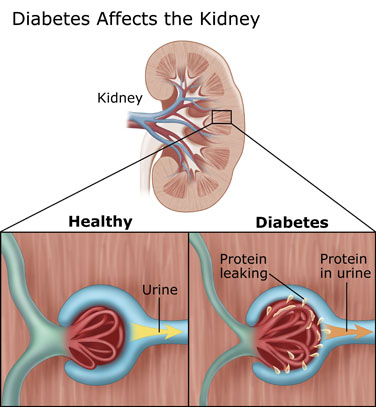Kidneys filter out waste products from the blood stream and control water and salt levels in the blood stream. The kidney also influences the blood pressure and helps keep glucose levels, red blood cell production and mineral balance on target.
Kidney Disease
Chronically elevated blood sugars damage blood vessels and filtering units in the kidneys. This condition is known as diabetic nephropathy.
Here are four facts you should know about this preventable condition.
- Early damage can go unnoticed for as long as a decade.
- The first sign of a problem is increased protein or microalbumin in the urine.
- Damage is less likely to occur in individuals whose blood sugars and blood pressures are controlled.
- Early detection and treatment may successfully stabilize and maintain kidney function.

Here are six steps you can take to prevent diabetic nephropathy.
- Control blood glucose.
- Control blood pressure.
- Control blood cholesterol
- Don’t smoke
- Avoid pain medications that can hurt your kidneys (such as non-steroidal anti-inflammatory drugs)
- Test urine for kidney function and urine microalbumin/creatinine ratios yearly.
Treatments:
Treatment focuses on controlling blood glucose, blood pressure and minimizing microalbumin or protein levels in the urine. The blood pressure medicines called angiotensin converting enzyme inhibitors (ACEs) or angiotensin receptor blockers (ARBs) are preferred treatments. These medications relieve pressure inside the kidney filtering unit and also help lower protein/microalbumin urine levels. If these medications cannot keep blood pressure lower than 140/80 mmHg, additional medications may be necessary.
Untreated or uncontrolled diabetic nephropathy causes blood pressure to rise and more and more protein to spill into the urine. In advanced stages, kidney function is impaired and the serum creatinine rises. The final stage is kidney failure, requiring dialysis or transplant.
- Normal kidney function (Urine microalbumin/Cr ratio: less than 30 mg/g Cr)
- Early Nephropathy (Urine microalbumin/Cr ratio: 30-300 mg/g Cr)
- Late Nephropathy (Urine microalbumin/Cr ratio: more than 300 mg/g Cr)
ASK AND LEARN ABOUT YOUR URINE CREATININE RATIOS
Self-assessment Quiz
Self assessment quizzes are available for topics covered in this website. To find out how much you have learned about Diabetes Complications, take our self assessment quiz when you have completed this section. The quiz is multiple choice. Please choose the single best answer to each question. At the end of the quiz, your score will display. If your score is over 70% correct, you are doing very well. If your score is less than 70%, you can return to this section and review the information.
